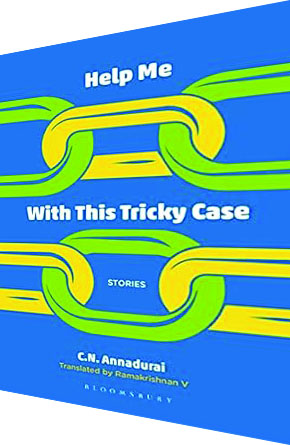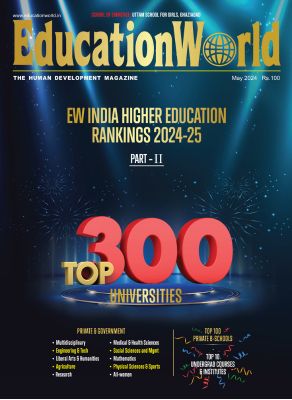 HELP ME WITH THIS TRICKY CASE: STORIES
HELP ME WITH THIS TRICKY CASE: STORIES
C.N. Annadurai (Translated from the original Tamil by Ramakrishnan V.)
bloomsbury
Rs.599
Pages 224
CN Annadurai, the first chief minister of Tamil Nadu after it was renamed, was also a literary giant with a prodigious output
CN Annadurai (1909-1969), popularly known as ‘Anna’ (elder brother), is one of Tamil Nadu’s greatest icons. His charisma and ideology resonate in Tamil politics to this day. ‘Arignar Anna’ or ‘Perarignar Anna’, meaning ‘Anna, the scholar’ served as the last Chief Minister of Madras State (1967-69), and subsequently became the first chief minister of Tamil Nadu after the state of Madras was renamed in 1969.
Anna was also a literary giant who wrote over 100 short stories, in addition to plays, novels and screenplays — a prodigious output, given his active, prominent political life and the role he played in shaping the political scenario in Tamil Nadu. His writings were imbued with passion for bringing about change, dealing with subjects like poverty and its links with crime and the legal system, widow remarriage, socialism, rationalism, upper caste oppression, and moral and ethical questions.
Help Me with this Tricky Case is a collection of 22 short stories in Tamil written between the years 1934-1965, translated into English by Ramakrishnan V, for whom Anna was the point “…at which all the contemporary branches of Dravidian ideology converge”. This book showcases Anna’s literary legacy, his belief system and insights on all aspects of the prevailing social and cultural milieu. Rich with irony, humour, and poignancy, these stories present the different social issues he explored. From a literary viewpoint, the collection displays not just his clever power over words, but also his clever understanding of the essence of a well-told short-story.
The editor/translator should be highly commended for his translation of Anna’s distinctive style, including his ironic rhetoric. The differences in syntax between languages have been bravely and effectively handled. Ramakrishnan modifies certain titles to capture the spirit of the original. ‘Upagari Ulaganathan’ in the original becomes ‘Charitable Chellappa’, and ‘Sumaar Subbaiah’ becomes ‘Approximate Arumugam’— showcasing clever puns and alliterations for which Anna was famous.
Such born-from-this-particular-soil idioms are a tough challenge, but Ramakrishnan finds solutions by using words and metaphors closest to the original, providing footnotes to explain the ironic play of words in certain places.
Anna the rationalist comes through incisively, with the subject being written about used to convey the message within. He questions blind faith in divinity that seems absent just when most needed; the futility of belief systems that do not address abject misery, and piety that is an outcome of fear rather than anything deeper. Gods and deities seem to be as riddled with angst and perils as the human beings they purportedly ‘created’. Likewise in the story ‘Karuppanasami Ruminates’, the pantheon of Gods ends up calling for a conference to air their woes and views.
Holy sites are not immune to commerce, housing exhibition halls where devotees show equal enthusiasm for the sanctum and silk garments being sold by a canny businessman. In ‘The Dodgy Devotee’ the author offers two viewpoints — of a wise elder who accepts that even divinity appears to support generous donors, and on the other hand, of a young passerby who scoffs at manipulations in places of worship being proportionate to donations received. This conventional view is juxtaposed with an emerging vision of the future, demanding change. Anna’s perceptive, compassionate eye is all too aware of the pitfalls and contradictions intrinsic to the human condition.
In the eponymous ‘Help Me With This Tricky Case’, a character questions the term ‘honest thief’. An oxymoron, yes, but in real life good and bad are not clearly defined. They coexist, and often it’s circumstances that dictate which quality surfaces. This is highlighted by the irony of an abjectly poor village naming itself ‘Ponnur’, meaning ‘land of gold’; an overzealous attention to detail can backfire, while inadvertent editorial goof-ups sometimes reveal the reality behind the façade.
Intention and consequences — well-meant and genuine good initiatives sometimes turn sour because intent has no power over outcomes. In ‘Charubala, the Social Worker’ the author displays the sharpness of his vision, seeing through seemingly genuine work to the emptiness within. Social service is not a game and can lead to grave repercussions if ground realities are ignored.
The language is unadorned, colloquial, with populist, even propagandist overtones woven in, and the author’s single-minded, missionary intention to reach the common man is clearly evident. All the more commendable then, that the spirit and intent of the work has been respected by the translator.
Worth-reading, this collection introduces Anna the literary icon to the non-Tamil world, providing an in-depth view into the times he lived in, in a country newly come to independence.
Ranjitha Ashoka (The Book Review)
Also read: Tamil Nadu: History agnosticism



























